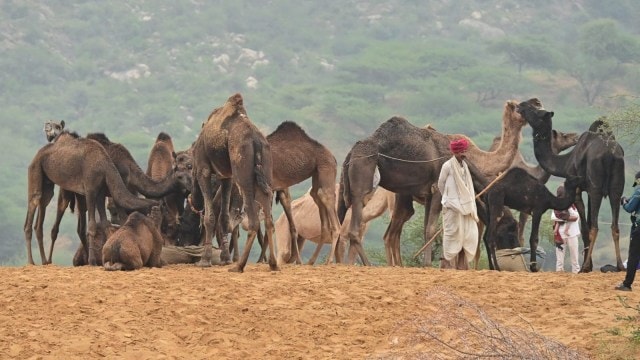From Rs 5,000 to Rs 90,000 — camel prices shoot up in Pushkar amid buzz over new rules, but hurdles remain for buyers
News about the govt’s plan to ease curbs on transporting camels out of Rajasthan has increased demand for the animals ahead of the Pushkar Fair that begins October 29. However, no notification has been issued to implement the new rules.
 Officials from the Animal Husbandry Department confirmed the decision to ease norms, saying that after the notification is issued, permits for transporting camels can be issued by Sub-Divisional Magistrates (SDMs) in an effort to make the process more accessible.
Officials from the Animal Husbandry Department confirmed the decision to ease norms, saying that after the notification is issued, permits for transporting camels can be issued by Sub-Divisional Magistrates (SDMs) in an effort to make the process more accessible. Kishanram Devasi sold a camel for Rs 45,000 this year, even before the iconic Pushkar Fair officially began. Last year, the man from Sojat in Rajasthan’s Pali district had struggled to get Rs 15,000 combined for two of his camels. The main reason for the massive jump in the price is the news that restrictions on transporting camels out of Rajasthan have been eased after a decade.
However, there’s a catch. While officials of the Rajasthan Animal Husbandry Department said a decision to ease the restrictions imposed in 2015 has been made, no notification has been issued so far. This means that even as buyers purchased camels at much higher rates this time, the curbs on them taking the animals out of the state remain in place.
In 2015, the Rajasthan government declared the camel its state animal and passed the Rajasthan Camel (Prohibition of Slaughter and Regulation of Temporary Migration or Export) Act. The main goal of the Act was to prevent the slaughter of camels for the meat industry. It prohibited the transportation of cattle out of Rajasthan without taking permission from the District Collector. This led to a plummeting of camel prices and even a reduction in the camel population.
Recently, news reports emerged that the restrictions had been eased, leading to prices shooting up. Officials from the Animal Husbandry Department confirmed the decision to ease norms, saying that after the notification is issued, permits for transporting camels can be issued by Sub-Divisional Magistrates (SDMs) in an effort to make the process more accessible. During events like the Pushkar Fair, officials said, a top officer of the Animal Husbandry Department, “who is usually present there”, also has the power to grant permits, significantly reducing the hurdles to transporting cattle out of Rajasthan. However, until a notification is issued, none of this can be put into practice, officials said.
Subhash Bari, the deputy director of the Camel Protection and Development Mission under the Animal Husbandry Department, said, “We have made new rules for camels in Rajasthan, under which a process has been notified outlining how to apply for transportation and obtain a permit. However, the power to issue permits still lies with the District Collector, not with the SDM, because the rules have not yet been fully implemented.”
“During livestock fairs like Pushkar, the Joint Director of Animal Husbandry, who is usually present at the fair, also has the power to issue permits, as per the new rules. But this notification is yet to be issued. We are trying to expedite the process so that the notification allowing Joint Directors and SDMs to issue permits can be released soon,” Bari said.
He clarified that the plan was not to entirely lift the restrictions on transporting camels outside Rajasthan, but on making the rules more flexible. Permits will only be given if the camel is being transported for tourism, dairy or agriculture purposes, not for slaughter, he explained.
The Pushkar Fair, one of India’s largest camel, horse and cattle fairs, officially begins on October 29 and will go on till November 5. However, the trading of livestock began days earlier.
Hanwant Singh, the founder of the Lok Pashu Palak Samiti, a Jodhpur-based group for the conservation of camels, said that the revised rules would make the transportation of camels easier, but pointed out that in the absence of a notification of the changes, buyers were still facing issues.
“The people who arrived in Pushkar from all over the country to purchase camels are now facing a problem transporting them,” he said.
Businessmen from Gujarat, Uttar Pradesh, and Telangana have already arrived in Pushkar to purchase camels, which are now being sold for up to Rs 90,000. Due to the restrictions, until last year, camels were going for as little as Rs 5,000. While the curbs impacted the economic viability of rearing camels, they also seem to have impacted the camel population. As per the latest livestock census in Rajasthan, which took place in 2019, the camel population stands at 2.10 lakh. This was a nearly 35% decrease from the previous livestock census that took place in 2012 and put the camel population that year at 3.26 lakh.







